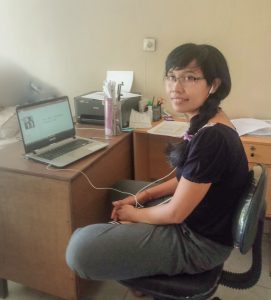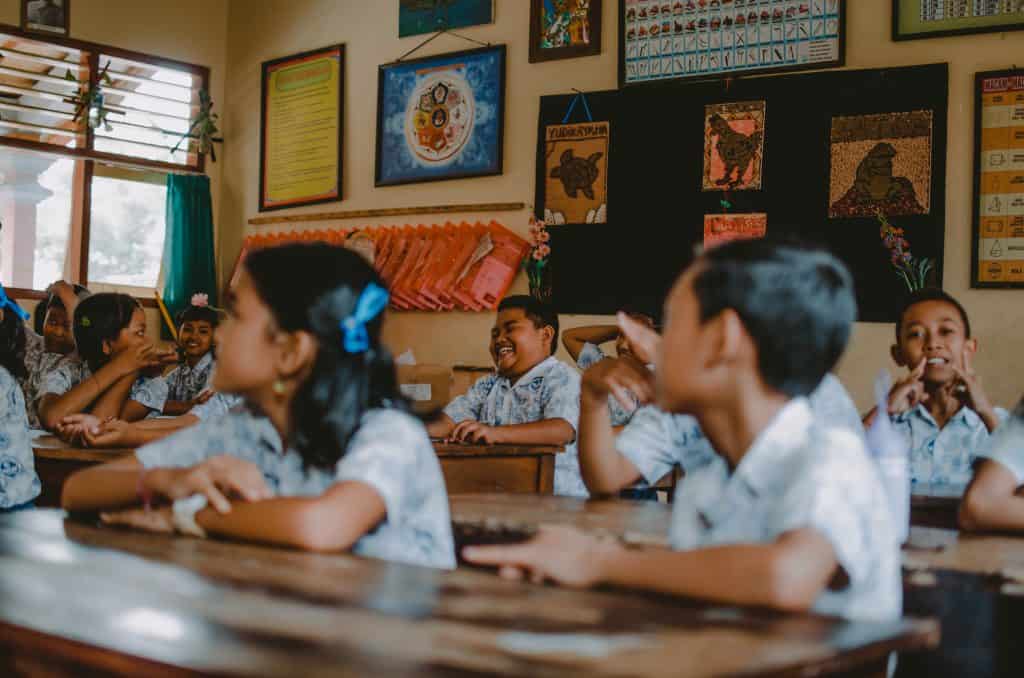Seit einigen Monaten ist nichts mehr so, wie es war. Auch wenn Grenzen geschlossen sind und wir uns alle gerade zurück in heimatliche Gefilde gezogen haben, verlieren wir den Blick und Draht nach Bali nicht. Zum Glück haben wir unsere liebe Ayu vor Ort, die wir Anfang letzten Jahres als Mitarbeiterin eingestellt hatten.
Für uns und für Euch hat sie die aktuelle Lage in Bali in einem Bericht zusammengefasst. Wir haben uns dazu entschlossen, ihren Bericht weder zu kürzen, noch zu übersetzen. Stattdessen könnt Ihr euch Ayus Sichtweise (auf Englisch) hier durchlesen.

Ayu in ihrem Homeoffice in Bali. ©️ Balipockets. e.V.
Nichtsdestotrotz hier ihre wichtigsten Punkte:
- Bali ist wirtschaftlich schwer getroffen, denn der Tourismus als wichtigster Wirtschaftszweig ist vollkommen zum Erliegen gekommen. Viele Menschen sind nur arbeitslos.
- Auch in Bali sind die Schulen geschlossen. Homeschooling wird zwar durchgeführt, doch nicht alle SchülerInnen verfügen über die notwendige technische Ausstattung und Wissen, um am Unterricht teilzunehmen. Das verschärft nur noch mehr bestehende Ungerechtigkeiten.
- Deshalb führt Ayu z.B. Online-Workshops bzw. Anrufe durch, um SchülerInnen in Englisch und in Medienkunde zu unterrichten.
Wie geht’s Bali? Ein vor-Ort-Bericht von Ayu
Covid19 is probably the worst thing that ever happened to Bali’s tourism businesses in history. The damage caused by this pandemic is way more terrible than other tragedies such as the Bali bombings and the eruption of Mt. Agung. When Bali experienced the bombing tragedies in 2002 and 2005, the hotel occupancy rates plunged down to 20 percent, while during the eruption of Mt. Agung the occupancy rates of all accommodations in South Bali were still at 60 percent – because the red (dangerous) zone was only 12 kilometres around the crater. But these days, the hotel occupancy rates are even lower than 10 percent, which resulted in more than a million people working in tourism sectors losing their job. Since April, almost 96 percent of hotels (in Bali) are closed, because there are no more tourist visits. The number will continue to increase to 100 percent, because existing tourists will need to go back to their home countries.
Bali Provincial Human Resources Department is collecting data of the affected workers across the island. So far, there are about 17000 workers who have been dismissed, as a result of the temporary shutdown for hospitality business in Bali (hotels, restaurants, travels and tourist attractions). At the moment, almost all hotels and restaurants in Bali are temporarily closed, some hotels are still operating, but with occupancy rates below 10 percent. Meanwhile, restaurants that are still operating have shortened their opening hours and only provide delivery and take-away service.
The number of positive cases of the Coronavirus (Covid-19) in Bali continues to increase. Until Monday (05/11/2020) morning, the number of positive patients infected with the virus reached 311 people. Most travelers have left Bali – Indonesia has banned all foreign arrivals until further notice, all citizens and visitors are asked to stay at home, work from home and follow the guidelines of „SOCIAL DISTANCING“. Food shopping and other important necessities are still possible (not a lockdown). Major events have been cancelled and the governor has instructed the Balinese to stay away from mass events (religions and non-religious), all tourist attractions and sites have been asked to close temporarily, including the beaches. The local authorities are checking every person who passes through the village. Not only make sure everyone wears a face mask, but some also do a quick-test on body temperature. Otherwise the situation is mostly calm and controlled. But this is a very sad situation because there are millions of people who are unemployed now who have families – they all have to suffer now.

So sieht es normalerweise in Balis Schulen aus. Aktuell müssen auch dort die Bänke leer bleiben. ©️ Balipockets. e.V.
Like elsewhere in the world, schools are closed and unlikely to open again until June. As schools have physically shut their doors, most are continuing with online studies, with schools making use of technology such as Zoom meetings and online examinations (but not all schools can do it). Many of the children are now in need of phones, as they cannot go to internet cafes to get their lessons. They need to find other children who share their phones for online learning. School closures of course have an impact on our work, as everything we do revolves around helping children to access education.
The problems start by the limited face-to-face between educators and students, the lack of technological knowledge of some teachers who are still unsure of operating computers and Android phones, when students have sent in videos or online-based questions. Parents have to assist their children now to answer questions or learn online – that results in some children learning less, because parents of students are also busy otherwise. Some parents also don’t have the technological requirements at home to access online-based technology provided by teachers from schools. Moreover, the teachers who have no knowledge of technology at all. But on the contrary, this Coronavirus teaches all parties to learn about online learning systems together, teaches students the meaning of an independent learning and is raising the awareness of parents for the importance of education for their children.
Actually, education in Bali during the Covid-19 pandemic has been well organized. But it did not run optimally due to the lack of students‘ knowledge about technology and not the lack of cell phones, so not all students are able to do online learning. Moreover it’s harder for students who live in remote areas with limited internet networks and parents who are unable to work or even though they can work only get a very low income. In addition, some teachers and parents have no knowledge about technology or teaching online.
Because of that, I try hard and spend a lot of my time doing a workshop on technology and giving free English lessons to give them the knowledge for these topics. And most students were happy with the workshop although some students did not like it due to constraints on internet data.
Gemäß unserem Leitbild der Bildungsförderung für alle Kinder und Jugendliche in Bali arbeiten wir gerade gemeinsam mit Ayu daran, Lösungen für die Probleme beim Homeschooling zu entwickeln. Wir denken dabei an die Anschaffung einfacher Smartphones und Ausstattung mit mobilen Daten. Über allem steht aber auch die zunehmen Verarmung der Familien, die sich auch mittelbar auf die Kinder auswirkt.
Es gibt viel zu tun! Dabei zählen wir wie so oft auf eure Unterstützung!
Weitere Informationen zu laufenden Projekten gibt es bei Facebook und Instagram!
Liebe Grüße,
euer Balipockets-Team.

